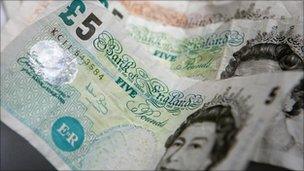NI consumers and business people face VAT and fuel pain
- Published

Northern Ireland consumers and business people will be hoping Wednesday's budget does not add to the financial strain they are already suffering.
Fuel prices and VAT rises are at the forefront of many people's minds as the Chancellor prepares to flash his battered old briefcase to the media.
David Taylor, who owns a plumbing company in Dundonald, said in the current economic climate his operational costs have increased dramatically and maintaining his profitability is difficult.
Mr Taylor would like to see the Chancellor try to restart the housing market, but he said increasing VAT to 20% for home repairs was not the way to do it.
"The VAT rise has had a major impact. Going back over the years we've noticed steady increases in VAT. We've gone from 15% to 17.5% and we're now looking at 20% VAT," he said.
"If we take repair costs for most middle-income families virtually everything you go to do on your property now is costing you between £2,000 and £3,000 to carry out.
"That equates to an add-on VAT cost of around £600-£800, which is a substantial amount of money. We in the industry feel that for many repairs and basics like maintaining heat in your home, you shouldn't have to pay VAT, we didn't used to have to pay it."
Mr Taylor pointed out that families are often faced with no choice but to pay out when it comes to home repairs
"As we saw during the freeze up, many middle income families were faced with distress purchases where equipment was failing and they had to replace it on the spot, so people are running into debt, borrowing to carry out these basic requirements."
Big changes
Meanwhile, some regular commuters to Belfast have had to make big changes to make ends meet.
John Gray lives in Warrenpoint and works in the centre of Belfast. He has chosen the bus over driving to work.
"It was going to cost me about £9 a day to drive up and down whereas on a weekly ticket on the bus it costs me less than £8 a day," he said.
"The other benefit is car parking in central Belfast, if you can find a spot, is quite expensive for a day. The other benefit of it is the simple convenience of it, the relaxing journey compared to sitting in traffic jams."
Newry student Louise Garvey, who travels to Queen's in Belfast, has chosen the bus much more reluctantly.
"Due to the fuel increase I found it really hard and now it's cheaper to get the bus, but it's really inconvenient because I've had to tell my friends I'm unable to take them up," she said.
"I'm saving roughly about £12 a week. I've a brand new car and it's just sitting at the house. So, it's a really big inconvenience because I spent all that money paying for it, insuring it, taxing it and now I'm not able to put petrol in the car."
Fiona Lively used to drive alone every day from Newry to her work in Belfast's Titanic Quarter, but not any more.
"It used to cost me about £55 a week to fill up on diesel, but now it's closer to £70 which is part of the reason my sister and I decided to car-share," she said.
"She no longer has to fill up her tank weekly, but she contributes towards mine. I would also go across the border to fill up on diesel, it works out a lot cheaper."
It remains to be seen whether Wednesday's budget will ease the pressure on businesses and consumers or force them to adopt even further financial compromises.